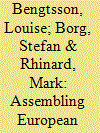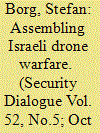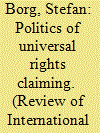|
|
|
Sort Order |
|
|
|
Items / Page
|
|
|
|
|
|
|
| Srl | Item |
| 1 |
ID:
165014


|
|
|
|
|
| Summary/Abstract |
The securitization of health concerns within the European Union has hitherto received scant attention compared to other sectors. Drawing on the conceptual toolbox of actor-network theory, this article examines how a ‘health security assemblage’ rooted in EU governance has emerged, expanded, and stabilized. At the heart of this assemblage lies a particular knowledge regime, known as epidemic intelligence (EI): a vigilance-oriented approach of early detection and containment drawing on web-scanning tools and other informal sources. Despite its differences compared to entrenched traditions in public health, EI has, in only a decade’s time, gained central importance at the EU level. EI is simultaneously constituted by, and performative of, a particular understanding of health security problems. By ‘following the actor’, this article seeks to account for how EI has made the hunt for potential health threats so central that detection and containment, rather than prevention, have become the preferred policy options. This article draws out some of the implications of this shift.
|
|
|
|
|
|
|
|
|
|
|
|
|
|
|
|
| 2 |
ID:
182651


|
|
|
|
|
| Summary/Abstract |
This article examines how unmanned aerial vehicles (UAVs), or drones as they are more popularly known, have changed practices of Israeli warfare. In order to do so, the article proceeds in three steps. First, it traces the emergence and development of the Israeli UAV programme. Second, it examines the main factors that have enabled its expansion. Third, it turns to some of the main implications of UAVs for the way in which the Israeli Defence Force (IDF) wages war. The article argues that the combined tactical use of UAVs employed for intelligence, surveillance and reconnaissance (ISR) tasks has amounted to a strategic effect: by dramatically enhancing the field of perception, UAVs have enabled the IDF to better control the battle rhythm. UAVs in the Israeli context have enhanced the IDF’s operational sustainability, since one’s own casualties have been virtually eliminated and civilian casualties have been stretched out over, rather than concentrated in, time. Throughout the article, the changing character of the UAV is emphasized. To capture this change and to unravel the interactions among technology, warfare and broader societal forces, the article draws on actor-network theory.
|
|
|
|
|
|
|
|
|
|
|
|
|
|
|
|
| 3 |
ID:
173158


|
|
|
|
|
| Summary/Abstract |
There is an extensive and rapidly growing body of literature on armed Unmanned Combat Aerial Vehicles (UCAVs) focused on the US War on Terror. However, smaller Unmanned Aerial Vehicles for military use, or what this paper refers to as tactical UAVs utilised by small states, have received much less scholarly attention ̶ despite their rapid proliferation in the last decade. In order to start rectifying this dual neglect of more limited UAVs employed by small states, the paper makes an empirical contribution to the study of tactical UAVs. Drawing on a substantial number of interviews and studies commissioned by the Swedish Armed Forces, the paper examines the Swedish UAV program, which is in certain ways representative of a smaller state’s efforts to incorporate UAVs into its armed forces. The paper argues that it is crucial to think in terms of systems rather than the UAV as a free-standing resource to be used on its own. If utilized along with other ISR assets, tactical UAVs may have a significant role to play in asymmetric conflicts.
|
|
|
|
|
|
|
|
|
|
|
|
|
|
|
|
| 4 |
ID:
134627


|
|
|
|
|
| Summary/Abstract |
The European Union is often conceptualised as an entity that is profoundly different from that of the modern state. Through a reading of the recent humanitarian crisis precipitated by large-scale migration into Greece, the paper challenges the understanding that the crafting of the European Union (‘Euro-crafting’) is qualitatively different from the crafting of the modern state. Conceptually, the paper proposes that Euro-crafting should be thought through in relation to practices of statecraft, instead of a priori postulated as qualitatively different from such practices. Putting such an understanding of Euro-crafting to work, the paper explores the recent humanitarian crisis precipitated by large-scale migration into Greece and demonstrates how practices of Euro-crafting mirror the major desire-driven practices of modern statecraft; practices of ordering, bordering, and identification.
|
|
|
|
|
|
|
|
|
|
|
|
|
|
|
|
| 5 |
ID:
153256


|
|
|
|
|
| Summary/Abstract |
This article contributes to a theoretical understanding of rights claiming as a specific form of political practice. The article develops and defends a post-foundationalist understanding of rights discourse as a way of making a claim to social change through appealing to a universal and illustrates such an understanding with the contestation over women’s rights in post-revolutionary Tunisia. To develop this argument, the article draws on Jacques Rancière’s notion of political subjectification and Ernesto Laclau’s engagement with the relation between the universal and the particular. To examine the relevance of such conceptualisation, the article turns to the struggle over women’s rights in post-revolutionary Tunisia, where secular and sacred understandings of the universal have been invoked frequently through rights discourse. In this context it is shown that claims to the universal give rhetorical force to rights discourse, and instead of depoliticising social relations, which rights discourse is often charged with, such claims are vital for political efficacy. However, whereas Laclau’s position helps us to understand rights as a language of resistance, a more robust defence of the universal is needed to defend rights in terms of emancipatory political change. To pursue this argument, the article turns to Rancière’s defence of axiomatic equality.
|
|
|
|
|
|
|
|
|
|
|
|
|
|
|
|
|
|
|
|
|